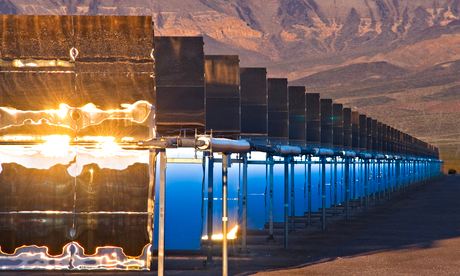
Why have we yet to make contact with alien civilisations? Perhaps, argues Keith Barnham in The Burning Answer, it is because they have observed our exploits with nuclear fuel and "have decided earthlings are too stupid to be worth colonising".
Barnham nails his colours to the mast from the off. Nuclear energy is not a necessary evil, it is just evil. And that goes for traditional fossil fuels and fracking too. In a post-Fukushima world battling climate change, Barnham's answer to the burning question of energy supply is simple: harness the power of the sun. After all, "the sunlight falling on the Earth in one hour is more than enough to supply all the energy demands of humankind for one year".
By solar power, Barnham doesn't just mean photovoltaic (PV) solar panels. As he points out, hydropower is indirectly generated by the sun as its rays fall on the sea, leading to the formation of clouds that later unleash rain that can be held back by a dam and used to power a turbine. And there is a host of other renewable options from wind to wave power that can be used to heat our homes and feed our digital devices.
The UK's lacklustre approach to such renewables, Barnham argues, is fed by a combination of factors, from the influence of the pro-nuclear and fossil fuel lobbies to the scant regard paid by the military towards renewable energy – a sharp contrast to their fervent interest in nuclear fission, exemplified by the proliferation of nuclear weapons.
Barnham's own digging into the fate of plutonium from the UK's civil nuclear reactors revealed the extent to which, in the 1960s, the material was being ferried to America. It was, he points out, a beneficial exchange. "In return, the British government has received nuclear material from the US which has clearly benefited the UK military nuclear programme," he says.
Having romped through electromagnetic waves, atomic structure and scientific history, Barnham embarks on an exposition, complete with convoluted metaphors, of how semiconductors work. But woe betide anyone who gets lost along the way – without a single diagram in the book, Barnham clearly doesn't see the value in using a picture to tell a thousand of his words. Which is a shame because it is 145 pages before he fully unleashes his arguments for a solar future.
But once he gets going, the energy fizzes off the page, and any doubters of the merits of solar power, be they scientists, commentators or policy wonks, are given a swift left-hook. George Monbiot's objections to feed-in-tariffs, David Mackay's "pessimistic" calculations regarding geothermal energy, and the Royal Society's apparent enthusiasm for nuclear reactors all get a bop on the nose.
Yet even though Barnham tackles some of the fundamental criticisms of solar power, his answers are at times disappointing. In response to the question of what happens to our renewable energy supply when the sun doesn't shine, Barnham simply replies that "the wind is usually blowing somewhere not far away". However, when later considering a project in Germany, a country he hails as leading the way with renewables, he points out that a source of gas – in this case biogas – was necessary to provide a back-up when wind and PV were unable to deliver the goods. The fact that in 2013 Germany's use of brown coal reached its highest level since 1990 is glossed over. Indeed, at times Barnham's zeal threatens to undermine support for his arguments, leaving even those of us who already fly the flag for solar power with the uncomfortable, nagging suspicion that there is more to the issues than he is letting on.
Barnham draws his diatribe to a close with a host of suggestions for going green, from installing a ground-source heat pump to switching to a green-energy provider – but it is impossible to avoid the conclusion that it helps if you are a homeowner with several thousand quid to spare.
Looking to the future, he disappointingly omits to mention the emerging technology of dye-sensitised solar cells, but his outlook for electric cars (fuelled by juice from renewable sources) is undeniably uplifting. As the spread of charging stations increases, well planned journeys will "become increasingly practical, pleasant and certainly cheap", he says. A thought many will warm to.

